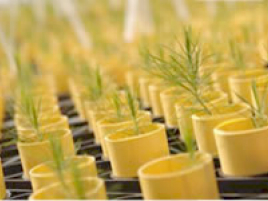U.S. Clears a Test of Bioengineered Trees
By Andrew Pollack | Май 20, 2010

Federal regulators gave clearance May 12 for a large and controversial field test of genetically engineered trees planned for seven states stretching from Florida to Texas.
The test is meant to see if the trees, eucalyptuses with a foreign gene meant to help them withstand cold weather, can become a new source of wood for pulp and paper, and for biofuels, in the Southern timber belt. Eucalyptus trees generally cannot now be grown north of Florida because of occasional freezing spells.
The Agriculture Department, in an environmental assessment issued Wednesday, said no environmental problems would be caused by the field trial, which could involve more than 200,000 genetically modified eucalyptus trees on 28 sites covering about 300 acres.
The permit would be issued to ArborGen, a biotechnology company owned by three big forest products companies: International Paper and MeadWestvaco of the United States, and Rubicon of New Zealand.
The Agriculture Department would have to grant separate approval for the trees to be grown commercially, clearance that ArborGen is already seeking.
Although two genetically engineered fruit trees — virus-resistant papaya and plum trees — are already approved for commercial planting in the United States, no forest trees have yet received that clearance in this country.
Genetically engineered trees have the potential to arouse even more controversy than genetically modified crops like corn or soybeans, which are made using the same techniques. That is partly because many people have an emotional attachment to forests that they do not have to cornfields.
Moreover, because trees live longer than annual crops and generally can spread their pollen farther, there are concerns that any unintended environmental effects may spread and persist longer in a woodland environment than in crop fields.
The Agriculture Department said that it had received comments opposing the field trial from 12,462 people or organizations, compared with only 45 supporters of the trial. But a vast majority of the opposing comments were nearly identical form letters, it said.
Critics say that the eucalyptus trees, even without foreign genes, may become invasive. They also said the trees were heavy users of water, could spread fires faster and could harbor a fungus that sickens people.
“They’ve been a disaster everywhere they’ve been planted,” said Anne Petermann, coordinator of a coalition called the Stop GE Trees Campaign.
The Sierra Club, in a comment submitted in February, wrote, “ArborGen’s plans to grow 260,000 artificially developed, highly experimental, alien, genetically engineered cloned trees in extensive field trials raises many troubling ecological questions about the short-term and long-term environmental impacts and risks that these trees pose in the United States.”
The Agriculture Department said it had found those possibilities to be unlikely.
“The species of eucalyptus in this permit has difficulty establishing without human intervention, even in warmer climates,” the department said in its initial environmental assessment, dismissing concerns that the genetically engineered trees would spread like a weed. It said other impacts would be limited because each experimental plot would be no larger than 20 acres and isolated from the others.
ArborGen, based in Summerville, S.C., had previously received permission to grow the trees on the 28 sites. But on only two of those sites, covering 7.6 acres, had it received permission to let the trees flower.
The new permit would allow more trees to be planted at the 28 sites and to allow flowering on 27 of the sites. While flowering would normally mean the possibility of reproduction, the trees in the trial have also been engineered to produce no pollen.
ArborGen argues that because they grow so fast, eucalyptus trees would minimize the amount of forest land needed for commercial plantations.
“You are able to produce more wood off fewer acres of land,” Barbara Wells, the company’s president, said in an interview. “It’s very positive from that standpoint.”















